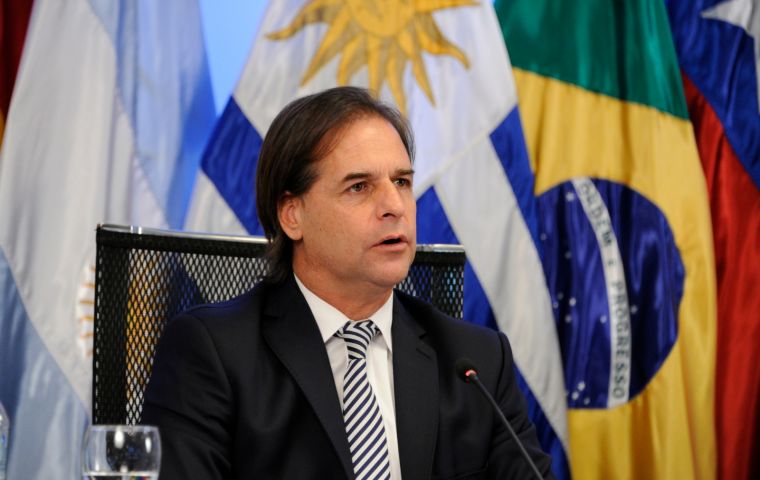MercoPress. South Atlantic News Agency
Uruguay, a failed Mercosur summit and China's long shadow
 Uruguay had independently applied to join the Trans-Pacific Partnership previous to the Mercosur summit. This followed bilateral trade talks with China and Turkey
Uruguay had independently applied to join the Trans-Pacific Partnership previous to the Mercosur summit. This followed bilateral trade talks with China and Turkey Presidential summit meetings of the Mercosur alliance were usually sedate comfortable affairs until Uruguay decided to “open up to the world” under its pro-business President Luis Lacalle Pou.
Hard at work negotiating new trade deals outside the regional bloc since taking office in March 2020, Lacalle Pou’s ambitions (propped by China) are running up against the other Mercosur members who are closing ranks on Uruguay, as political alliances shift.
Those tensions were on display at the Mercosur summit in Montevideo in December. There were accusations of foul play and unsportsmanlike tactics on news that Uruguay had independently applied to join the Trans-Pacific Partnership days previously, an 11-member trade alliance including Australia and Japan. This followed separate bilateral trade talks with China and Turkey earlier this year.
“Uruguay needs to choose if it is with Mercosur,” Argentina’s foreign minister, Santiago Cafiero, insisted on the sidelines of the summit earlier this month, in which Uruguay transferred the Mercosur chair to Argentina for the next six months.
According to Mercosur rules, no individual country is allowed to negotiate preferential agreements with third parties. But some experts have described the protectionist alliance as one of the “least effective” of its kind anywhere in the world, both in terms of trade among its members and with external partners. It has also struggled to finalize a free trade agreement with the EU, a process that is entering its 24th year.
Those delays and frustrations are among the factors driving Montevideo’s mission to explore opening up to foreign markets alone. Mercosur can no longer lead “with an early 1990s mindset”, Lacalle Pou has said, or pull back a member’s economic progress.
Chile, Colombia, Peru and Mexico have all been looking towards the Pacific to expand trade with Asia. All have joined the TPP, with the exception of Colombia, while Mercosur has dawdled.
The three other Mercosur member states have called for regional unity, threatening to penalize Uruguay with a series of undisclosed measures if it continues to pursue commercial arrangements alone.
Critics describe the threats as bullying against the smaller country because it has triggered real discussions about restructuring the alliance, which could ultimately lead to a break-up. Argentina and Brazil account for nearly 90% of the bloc’s GDP, giving them more influence in negotiations. Some say the two bigger countries use Mercosur as a trade shield, to protect their industries from global competition and their home markets.
Uruguay’s foreign minister maintains that the country wants to modernize, not cut away from the bloc, that represented roughly a third of overall Uruguayan trade in 2022.
Last week the Uruguay-China chamber of commerce reiterated its support for the steps taken by the Uruguayan government to deepen trade relations between the two economies, saying that “advancing” the FTA with China was “central” to their strategy.
China's interest is not necessarily a country with a population of 3,5 million but rather a door through which it can squeeze into the 220 million Brazilian market.
But as of January, leftist Luiz Inácio Lula da Silva takes over the Brazilian presidency with the strong support from the domestic manufacturing lobby. Outgoing leader Jair Bolsonaro had been an ally of Lacalle Pou, and to a lesser extent Mario Abdo Benítez of Paraguay.
However Bolsonaro did not prioritize regional co-ordination. Instead, in Uruguay he saw a tool to change the border structure of Mercosur for his conservative government’s own benefit — according to one Brazilian diplomat, Brazil gave neighboring Uruguay “breathing space”, to make advances with China and other partners. Bolsonaro’s outgoing finance ministry even pledged support for Lacalle Pou’s efforts to make Mercosur more flexible, defying the foreign ministry in a rare declaration after the December summit.
Lula has other ideas and other compromises. He has already emphasized that greater Latin American integration and multilateralism will be critical to his administration’s foreign policy.
Lula is strongly in favor of bolstering trade, in particular with China, (one of his first overseas visit), which remains Brazil’s biggest buyer. In Lula’s previous two terms as president in the early 2000s, Brazil became a member of the Brics bloc with Russia, India and China, which became an important tool for global co-operation




Top Comments
Disclaimer & comment rules-

Read all commentsUruguay's president seems to have missed the boat of history.
Dec 30th, 2022 - 01:47 pm 0Commenting for this story is now closed.
If you have a Facebook account, become a fan and comment on our Facebook Page!